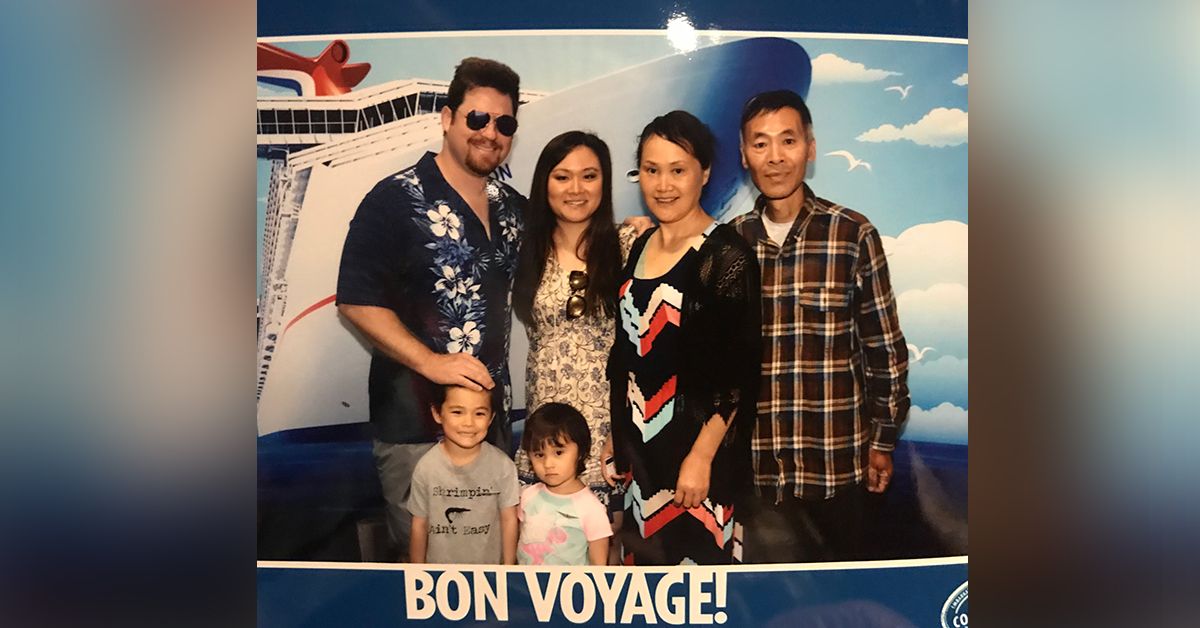A terminally ill grandfather's cruise with his American family to the Bahamas ended with unexpected detention and deportation back to China at the port of entry in Jacksonville, Florida.
Yuanjun Cui and his wife Huan Wang planned on visiting their daughter, son-in-law, and two small grandchildren, who are Missouri residents, for six months. The couple, both of whom are 59-year-old executives for China Mobile from Shenyang, originally planned to return to China on 19 June 2018. Cui has terminal stomach cancer and had been receiving treatment in China.
But the plan went wrong on 21 May 2018 when Cui and Wang were detained by U.S. Customs and Border Protection (CBP) after disembarking from their four-day Carnival Cruise trip. According to family members, they were put on a same-day flight by CBP back to China.
The couple's son-in-law Joe McDevitt, a pilot for the Army National Guard in Missouri, told us the entire family -- including his wife Zhengjia, a naturalized U.S. citizen, and their American-born children, ages 3 and 4 years old -- were also detained for about an hour:
They wouldn’t let me contact a lawyer or anybody. The only way they let me contact a lawyer was to leave my family behind and cross the border by myself.
I’m an Apache pilot in the Missouri National Guard. My brother is also an Apache pilot. My dad retired from the Air Force. My grandfather joined the Marine infantry in World War II. After all the things my family has done for our country, this is the way they’re going to treat us? They just treated us like shit.
The incident caused the family to question why the elderly couple, one of whom is in frail condition and who pose no known security risk, were suddenly deported.
Pedro Rios, an immigrant advocate for the American Friends Service Committee, said CBP officers have more discretion at reviewing admission requests at ports of entry, and he believes CBP arrested the couple because while they were in the United States, they applied for green cards: "At that point what might have happened is because they applied for a green card, CBP might have determined these individuals came with a tourist visa as a pretext with plans to stay longer."
Susan Pai, the family's attorney, told us the decision to apply for green cards was the result of the family seeing Cui's condition, which had degraded considerably. They feared his condition would further collapse and that he could die while in the U.S.
Barring this eventuality, Pai said, the couple had no intention to stay in the U.S. beyond the six months allowed by their visitor's visa, as evidenced by the fact they held return airline tickets to China. Additionally, she said, when they arrived at the Jacksonville port at the end of the cruise, they only asked to stay in the U.S. for 30 days, which would have allowed them to fly out on 19 June as originally planned: "CBP knew they had no immigrant intent. Not only did they see their return ticket, they actually asked the U.S. citizen son-in-law to trade it in to pay for their ticket back to China tonight."
In response to our inquiries on the matter, CBP sent us the following statement:
Under U.S. immigration law [Section 291 of the INA [8 USC 1361] applicants for admission bear the burden of proof to establish that they are clearly eligible to enter the United States. In order to demonstrate that they are admissible, the applicant must overcome ALL grounds of inadmissibility.
Specific grounds of inadmissibility can be found in INA § 212(a) and list more than 60 grounds of inadmissibility divided into several major categories, including health-related, prior criminal convictions, security reasons, public charge, labor certification, illegal entrants and immigration violations, documentation requirements, and miscellaneous grounds.
Due to privacy laws, CBP is prohibited from discussing specific cases.
Pai told us she believes the couple was intimidated into withdrawing their application for readmission and threatened with imprisonment (as well as the possibility of never seeing their grandchildren again). Neither Cui or Wang speak or understand English, she said.
Pai added that the implication Wang and Cui were found not to be eligible to enter the U.S. after the cruise was disproved by a video recorded by McDevitt in which a CBP officer told McDevitt that the couple had withdrawn their application while they were in custody:
Ultimately McDevitt said he fears the incident means the last time his children will have seen their grandfather will be when Cui was arrested by CBP. He told us, "I have a 3 and 4 year old who just watched their grandparents get arrested, They did not take it well."
